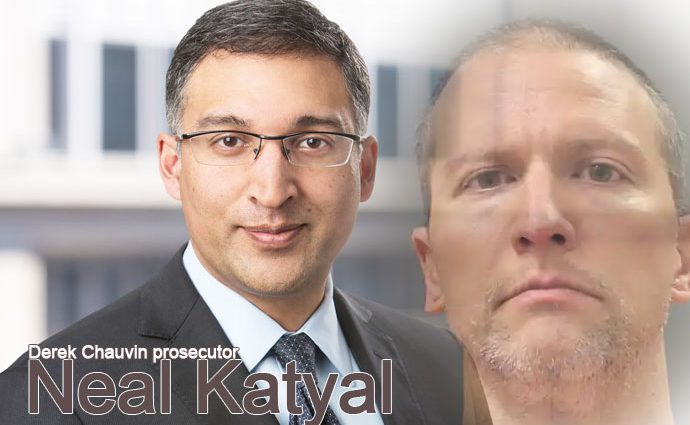After the jury was selected, from Monday March 29, the George Floyd murder trial is currently proceeding in Minneapolis in the United States where former police officer Derek Chauvin is being tried for the death of George Floyd. Neal Katyal is the chief lawyer working with state prosecutors offices of Attorney General Keith Ellison and Assistant Attorney General Matthew Frank.
Derek Chauvin is facing charges of manslaughter, second-degree murder and third-degree murder for the death of George Floyd. But as is expected, the lawyers are having their day in court – both prosecuting and defending lawyers are leaving no stone unturned. With the trial set to recommence on Monday, 5 April, a one could speculate, Derek Chauvin’s lawyer seems to have done a good job.
The prosecution has hired an Indian American specialist lawyer Neal Kumar Katyal. Neal Katyal is a former U.S. acting solicitor general who has argued dozens of cases before the U.S. Supreme Court. Katyal led a successful effort to get a third-degree murder charge reinstated against Chauvin after the judge initially ruled it didn’t fit the circumstances.
The death of George Floyd drew widespread outrage last May after a video circulated online showing Officer Derek Chauvin holding his knee on Mr. Floyd’s neck on a Minneapolis street corner as he gasped for breath.
Mr. Floyd’s death spurred nationwide protests over police brutality and a reckoning over everything from public monuments to sports team names. Now the case is finally being litigated in criminal court, with Mr. Chauvin facing charges of manslaughter, second-degree murder and third-degree murder.
Derek Chauvin is charged with manslaughter, murder in the second degree and murder in the third degree (successfully reinstated when the trial began. Punishment for manslaughter is imprisonment for no more than 10 years in jail. That looks to be a fair outcome in this case.
To go harder, the prosecution has gone in with second and third degree murder charges. The maximum jail term for second degree murder is 40 years. But the test for the prosecution is very stringent, which will be not an easy task for the prosecution to prove. The element of “intent (without premeditation)” must be proven to exist for a charge of second degree murder to be upheld. From the facts of the case, I believe it is an uphill task for any prosecutor to come up with argument to establish intent.
Thus soon after Neal Katyal came on the scene, the collective prosecution wisdom led by him went in to reinstate the third degree murder charge back into play. And they did.
In the current case, the third degree murder charge looks a lot simpler proposition for the prosecution.
For someone to be convicted of a murder in the third degree, one must “without intent to effect the death of any person, cause the death of another by perpetrating an act eminently dangerous to others and evincing a depraved mind, without regard for human life”.
Also read: Derek Chauvin won’t get 40 years in jail
Derek Chauvin’s act of keeping on pressing his knee for more than 9 seconds on the neck of George Floyd when George Floyd was complaining of not being able to breath, will perhaps meet the legal test required for the charge to be proven beyond reasonable doubt, if the force used was excessive and unnecessary.
Derek may face 25 years in jail, on the charge of third degree murder alone.
That explains the arguments in court of the prosecution where the prosecution led the evidence to suggest that Derek Chauvin’s act to press his knee to the neck of George Floyd, even if he (Derek Chauvin) was improvising in the situation, was not an acceptable use of force. The prosecution led the evidence through Minneapolis police lieutenant Richard Zimmerman.
Derek’s defence attorney Eric Nelson attacked this argument in two steps. First he extracted out of Zimmerman a concession that police officers while on the job “can improvise” for their own (personal)safety, in order to do their duty effectively.
Under cross-examination, Richard Zimmerman also conceded that the whole business of street policing had changed a lot since he (Zimmerman) was last on patrol, in 1993. He further conceded that there weren’t body cameras and mace spray as part of the kit when he was last on the beat.
The trial continues on Monday, April 5.
Similar Posts by The Author:
- This is why Peta Credlin should apologize to Australian Indians
- India and the United States Spearhead Global Disaster Resilience Efforts through CDRI
- A big win for Nurul Khan in his bid to unmask Victorian ‘Labor dirt sheet plotters’
- Australian Muslims call for transparency and accountability of Law Enforcement Action
- Problems of Arvind Kejriwal lie in the Charge-sheet against Manish Sisodia

